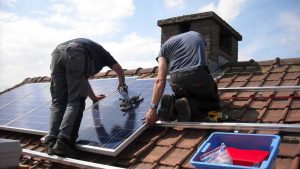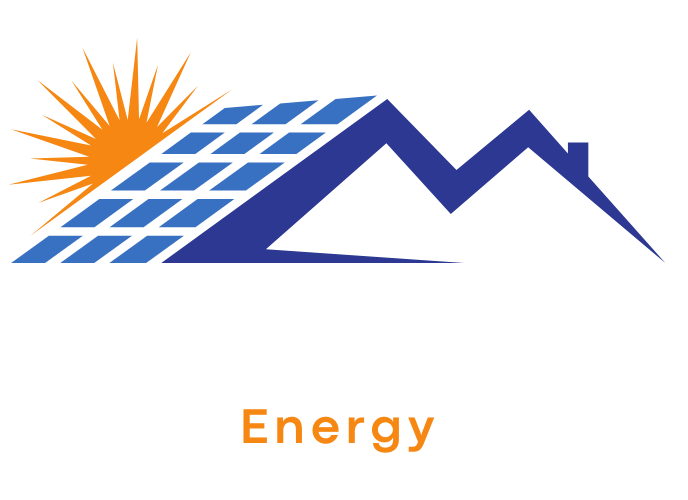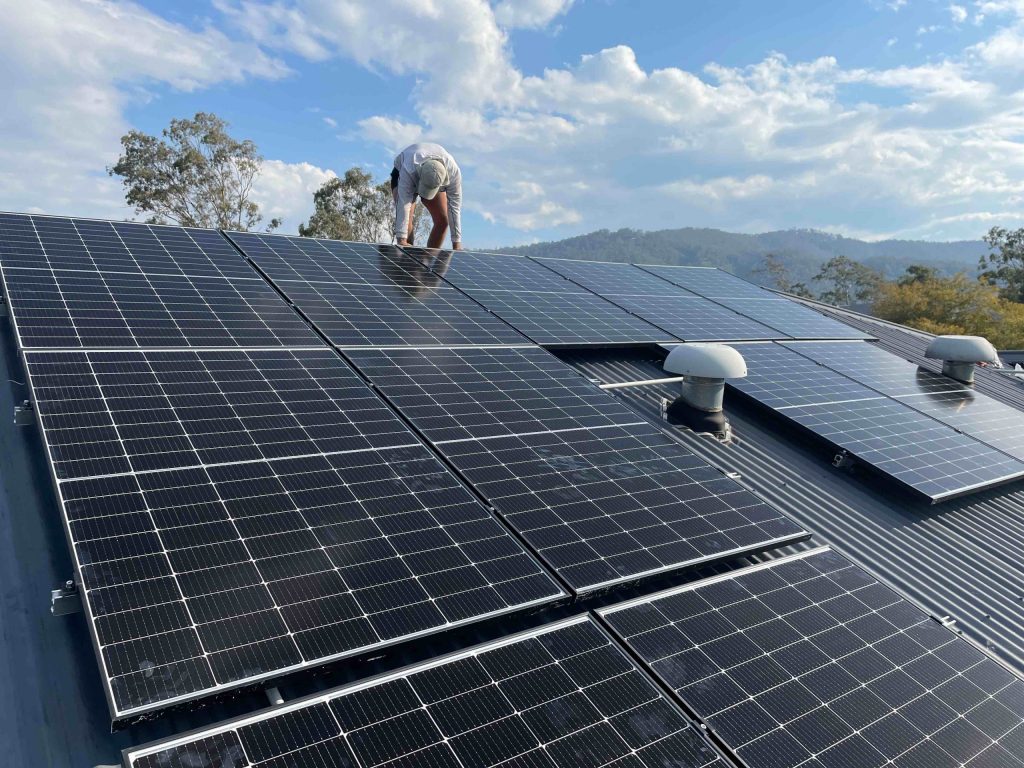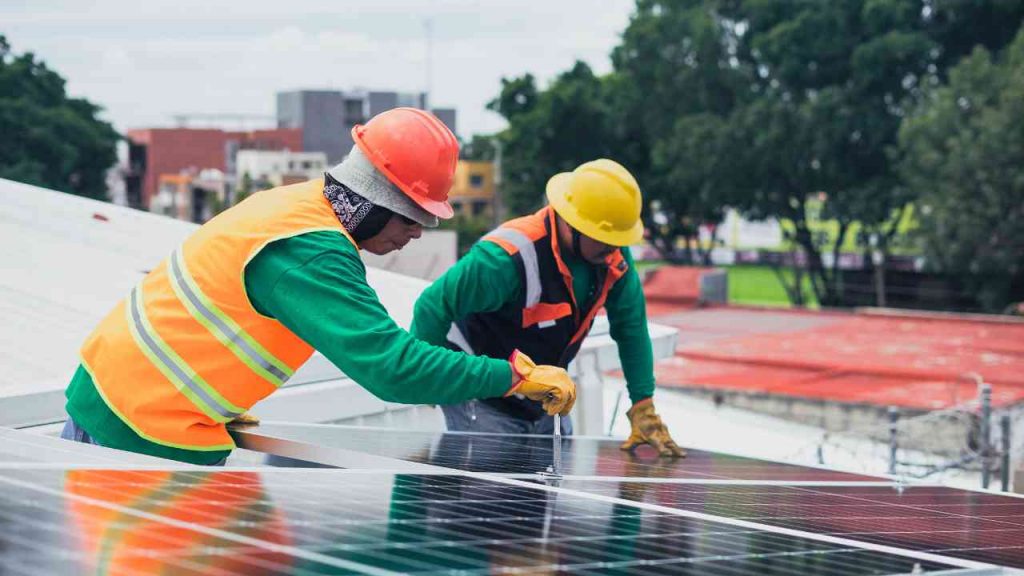Solar power is a key player in the renewable energy landscape. It’s a clean, sustainable solution that’s gaining traction worldwide.
A solar panel system on a residential roofby Kris D’souza (https://unsplash.com/@krisissleepy)
Yet, as our energy needs grow, so does the need for more efficient solar systems. This is where solar panel expansion comes into play.
Expanding your solar system can significantly boost your energy production. It can also enhance your solar efficiency and lead to greater energy savings.
But how do you go about upgrading your solar system? What are the key considerations when moving from a 6.6kw system to a larger 13.3kw system?
This guide will walk you through the process. It will provide practical advice and insights to help you make an informed decision.
So, if you’re considering a solar panel upgrade, read on. Let’s explore how you can make your solar bigger and better.
Understanding Solar Panel Expansion
Solar panel expansion refers to the process of increasing the capacity of your existing solar system. This is typically achieved by adding more solar panels to your array.
The goal of solar panel expansion is to generate more electricity. This can be particularly beneficial if your energy needs have increased since you first installed your solar system.
But it’s not just about meeting higher energy demands. Expanding your solar system can also improve your solar efficiency. This means you’ll be able to generate more power from the same amount of sunlight.
Moreover, a larger solar system can contribute to reducing your carbon footprint. By generating more of your own electricity, you’ll rely less on grid power. This can help reduce greenhouse gas emissions and promote a more sustainable future.
The Benefits of Expanding Your Solar System
Expanding your solar system can offer a range of benefits. One of the most significant is the potential for increased energy savings. By generating more electricity, you can reduce your reliance on grid power. This can lead to substantial savings on your energy bills over time.
Another key benefit is the environmental impact. Solar power is a form of renewable energy, which means it’s a clean and sustainable way to generate electricity. By expanding your solar system, you can contribute more to the reduction of greenhouse gas emissions. This can help combat climate change and promote a healthier environment.
Here are some additional benefits of solar panel expansion:
Increased property value: Solar systems can increase the value of your property. This can be particularly beneficial if you plan to sell your property in the future.
Energy independence: With a larger solar system, you can generate more of your own electricity. This can give you greater energy independence and protect you from rising energy prices.
Potential for net metering: In some areas, you can sell excess electricity back to the grid. This can provide additional savings and make your solar system even more cost-effective.
In the next section, we’ll look at how to assess your energy needs and solar potential. This is a crucial step in planning a solar panel expansion.
Assessing Your Energy Needs and Solar Potential
Before you consider expanding your solar system, it’s important to assess your energy needs. This involves looking at your electricity bills to understand your current energy usage. You should also consider any future changes that might increase your energy needs, such as buying an electric vehicle or adding a home extension.
Next, you need to assess your solar potential. This involves looking at the amount of sunlight your property receives and the space available for additional solar panels. You may need to consider factors such as shading, roof orientation, and local climate conditions. These can all affect the performance of your solar panels.
By understanding your energy needs and solar potential, you can make an informed decision about solar panel expansion. This will help ensure that your expanded solar system is efficient and cost-effective. In the next section, we’ll discuss the differences between common residential solar system sizes and what you need to know when upgrading.
From 6.6kw to 13.3kw: What You Need to Know
If you’re considering a solar panel expansion, you might be thinking about upgrading from a 6.6kw system to a 13.3kw system. But what does this mean in practical terms?
A 6.6kw system typically consists of around 15solar panels. It’s a common choice for residential properties, providing enough power for an average-sized family home. However, if your energy needs are increasing, or you want to generate more power to sell back to the grid, you might consider upgrading to a 13.3kw system.
A 13.3kw system generally consists of around 30 solar panels. This means you’ll need sufficient roof space to accommodate the extra panels. You’ll also need to consider the weight of the additional panels and whether your roof can support them.
Upgrading to a 13.3kw system can significantly increase your energy production and potential savings. However, it’s important to consider the practical implications and costs involved. In the next section, we’ll discuss the technical considerations for solar panel upgrades.
“Comparison of 6.6kw and 13.3kw solar systems

by American Public Power Association (https://unsplash.com/@publicpowerorg)”
Technical Considerations for Solar Panel Upgrades
When planning a solar panel expansion, there are several technical aspects to consider. One of the first things to look at is your current inverter capacity.
Inverters convert the direct current (DC) produced by your solar panels into alternating current (AC) that can be used in your home. If you’re expanding your solar system, you may need to upgrade your inverter to handle the increased power output.
Another important consideration is the orientation and tilt of your solar panels. To maximize solar efficiency, your panels should be positioned to receive the most sunlight throughout the day. This may require adjustments during an expansion.
Finally, consider the impact of shading on your solar panels. Buildings, trees, and other obstacles can cast shadows on your panels, reducing their efficiency. When adding more panels, ensure they’re placed in locations with minimal shading.
In the next section, we’ll discuss the financial implications and potential return on investment of expanding your solar system.
Solar panel expansion is a strategic move towards enhancing your energy production and efficiency. By adding more solar panels to your existing system, you can generate more electricity, meet higher energy demands, and ultimately reduce your reliance on grid power. This upgrade not only leads to increased energy savings but also contributes to a greener environment by reducing greenhouse gas emissions. Moreover, with a larger solar system, you can potentially increase your property value, achieve energy independence, and even explore opportunities for net metering, further maximizing the benefits of your solar investment.
by American Public Power Association (https://unsplash.com/@publicpowerorg)”
Financial Implications and ROI of Solar Expansion
Expanding your solar system is an investment. It involves upfront costs for the additional panels, possibly a new inverter, and installation. However, the long-term benefits can outweigh these initial expenses.
The return on investment (ROI) from a solar panel expansion comes from the energy savings on your electricity bill. With a larger system, you’re generating more power, reducing the amount you need to draw from the grid. Over time, these savings can cover the cost of your expansion and even generate a profit.
It’s also worth noting that an expanded solar system can increase the value of your property. Prospective buyers are often willing to pay a premium for homes with efficient, high-capacity solar systems. This can make solar expansion a financially sound decision, even if you plan to sell your home in the future.
Local Regulations and Incentives for Solar Expansion
Before embarking on a solar panel expansion, it’s crucial to understand the local regulations. Some areas have restrictions on the size of residential solar systems. Others may require specific permits for larger installations. It’s important to research these regulations to ensure your expansion is compliant
Incentives can also play a significant role in your decision to expand. Many regions offer tax credits, rebates, or feed-in tariffs for solar power. These incentives can significantly reduce the cost of your expansion and speed up the ROI. It’s worth checking with your local government or a solar professional to learn about the incentives available in your area.
Remember, regulations and incentives can change. Stay informed to make the most of your solar panel expansion. It’s one more way to ensure your investment in renewable energy is a smart one.
Choosing the Right Installer for Your Solar Panel Upgrade
Choosing the right installer is a key step in your solar panel expansion. A certified, experienced installer will ensure your system is installed correctly and efficiently. They can also provide valuable advice on the best equipment for your needs and help navigate local regulations and incentives.
Remember, not all installers have experience with larger systems. Be sure to ask potential installers about their experience with solar panel expansions. Check their references and reviews to ensure they have a track record of successful installations. Your solar panel expansion is a significant investment, so it’s worth taking the time to choose the right installer.
The Role of Net Metering and Battery Storage
Net metering plays a crucial role in maximizing the benefits of your solar panel expansion. It allows you to feed excess energy back into the grid, effectively turning your meter backwards. This can significantly offset your energy costs and even earn you credit on your utility bill.
Net metering diagramby Ben Hershey (https://unsplash.com/@benhershey)
Battery storage complements your expanded solar system by storing excess energy for use when the sun isn’t shining. This can further increase your energy savings and provide a backup power source during outages. As you plan your solar panel expansion, consider the benefits of adding a battery storage system.
Remember, the specifics of net metering and battery storage can vary by location and utility company. Be sure to research your local regulations and consult with your installer to understand how these factors can impact your solar panel expansion.
Maintenance and Monitoring of Your Expanded Solar System
Once your solar panel expansion is complete, regular maintenance and monitoring are key to ensuring optimal performance. Regular inspections can help identify any issues early, preventing potential damage and prolonging the lifespan of your system.
Investing in a monitoring system can also be beneficial. It allows you to track the performance of your expanded solar array in real-time. This can provide valuable insights into your energy production and consumption, helping you further optimize your solar efficiency and savings.
Conclusion: Making a Sustainable Choice for the Future
In conclusion, expanding your solar system is not just about increasing energy production or savings. It’s about making a sustainable choice for the future. By upgrading your solar panels, you’re contributing to renewable energy efforts, reducing your carbon footprint, and paving the way for a greener, more sustainable future.
Please take a look at the Solar Packages we offer: https://djsolar.com.au/solar-panels-solar-energy-systems-installer-brisbane/






